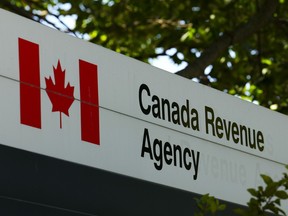Sandra Fry: It’s tempting to treat a tax refund like a surprise windfall, but it’s worth putting your money to good use
Reviews and recommendations are unbiased and products are independently selected. Postmedia may earn an affiliate commission from purchases made through links on this page.
Article content
It’s tempting to treat a tax refund like a surprise windfall, but even though you might not have been expecting it, it’s your money and worth putting to good use.
Whether to use your tax refund to pay down debt or save depends on your individual financial situation and goals. Here are some things to consider as you make your decision.
Article content
Paying down debt will always put you ahead. You’ll save on interest payments over the long run and improve your credit rating. Less debt or smaller payments frees up money in your budget, allowing you to allocate funds to other expenses or goals.
Advertisement 2
Article content
Eliminating debt also reduces stress and improves your overall sense of well-being. If you have high-interest debt, such as credit cards, personal loans, an overdraft or a payday loan, using your tax refund to pay down what you owe is a smart move.
Saving your tax refund can also provide you with a lot of peace of mind, especially if you have debt or are worried about your source of income remaining stable. You could jump-start an emergency savings account or bolster the one you already have. An account with three to six months of your essential living expenses serves as a safety net and is an important part of every financial plan. Saving towards long-term goals such as a downpayment for a home or new car, education for your kids or retirement are also worthwhile goals.
Saving towards long-term goals can be combined with investment opportunities. Education for your kids can be topped up with government grants in a registered education savings plan (RESP). A tax-free savings account (TFSA) or the new first home savings account (FHSA) allow you to grow your savings tax free, and contributing to a registered retirement savings plan (RRSP) also helps form a balanced approach to managing money you receive via a tax refund.
Article content
Advertisement 3
Article content
Connect with a financial adviser or tax professional to determine how best to contribute to an RRSP while generating a refund next year that can be either re-invested or used for other expenses. If you’re already debt free, or the debt you have is manageable and the payments you’re making are chipping away at what you owe, setting your tax refund aside for another purpose will help ensure you don’t inadvertently spend it on unintended expenses.
There’s no one-size-fits-all answer for how best to spend your tax refund, and there are options to consider beyond strictly saving the money or using it to pay down debt.
The Canada Revenue Agency said the average refund processed for the 2023 tax year so far is $2,137, as of March 25, 2024. One option is to save part of your refund and spend the rest. To determine the split, evaluate your priorities and assess your current financial circumstances. If the responsible choice is also the “no fun” option, allow yourself a small splurge to make it easier to make the wise decision.
Other options for spending your tax refund might include investing in education or skills development for yourself. Sign up for courses, workshops, or certifications that enhance your knowledge and career prospects. The benefits, financial and otherwise, can last a lifetime.
Advertisement 4
Article content
If you’re a homeowner, consider allocating your refund towards home improvements. Whether it’s renovating a room, upgrading appliances or enhancing energy efficiency, these investments can save you money and increase your property’s value.
You may also wish to use a portion of your tax refund to make a positive impact on your community or a cause you care about. Donations to charitable organizations benefit others and provide potential tax deductions next year.
Another way to use a tax refund is to invest in your health and well-being. If your budget is tight and money for a gym membership, supplies for your hobby or a wellness retreat is out of reach, set your tax refund aside to fund these expenses separately. The money could also go towards preventative health measures such as vaccinations or maintaining a healthier diet.
Pair the additional funds with low- or no-cost options in your community — for example, local fitness classes, parks for outdoor exercise or online mental health resources — to get the biggest bang for your buck. Prioritizing self-care and your overall well-being will pay dividends and contribute to a healthier and happier life.
Advertisement 5
Article content
If you’ve always wanted to turn a hobby into a revenue stream, become a consultant, set up a short-term rental space in your home or start doing freelance work, you could use your tax refund to cover start-up costs for insurance, a business licence, education, advertising or supplies. Just make sure to account for any income you earn from your side hustle so that next year’s tax filing doesn’t leave you with a big bill.
Technology is not typically considered an investment, but modern devices can enhance your productivity and connectivity. If your laptop, phone, camera or other gadgets and devices are outdated, consider using part of your tax refund to upgrade them. Ensure, however, that you don’t get carried away and buy more accessibility than you truly need. Avoid committing to long-term contracts and look for sales and special offers to help keep your spending reasonable.
Recommended from Editorial
-

Spring forward with this 10-minute financial makeover plan
-

The pros and cons of consolidating your debt
-

Here’s how to start a side hustle that works
As with any financial decision, evaluate what matters most to you and then make an informed choice that aligns with your personal values and goals.
Sandra Fry is a Winnipeg-based credit counsellor at Credit Counselling Society, a non-profit organization that has helped Canadians manage debt for more than 27 years.
Bookmark our website and support our journalism: Don’t miss the business news you need to know — add financialpost.com to your bookmarks and sign up for our newsletters here.
Article content
























Discussion about this post